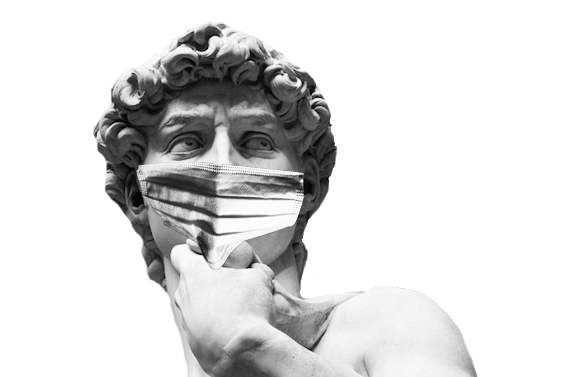The Arts and Coronavirus

(Design by Daily Utah Chronicle)
April 16, 2020
The lights of Broadway have dimmed. Artists across the industry announce tour cancelations through Instagram videos. Releases are postponed. Museums and galleries — once celebrated centers for escapism — are boarded up. Movies theaters, concert venues and libraries alike are bare. Each day ushers in a new wave of postponements, cancelations and upsets.
These are not scenes from the latest horror film or dystopian novel adaptation. This is the alarming reality of the arts world during the COVID-19 pandemic. Fans and consumers alike around the world are mourning a cancelation or postponement of some kind — whether it’s an upcoming concert, a theatre production or a movie. Even many of the most minute facets of the arts world, like going to a restaurant to eat, have been taken from citizens during this time.
The closures and postponements beg the question, though, how can the arts and entertainment industry stay afloat during the pandemic? Like sports, this is an industry that relies on citizen engagement and involvement. COVID-19 has drastically changed the course of our everyday lives, but the lasting impact it could have on industries like these is grave.
The Big, Tainted Picture
Broadway, Coachella, Live Nation and each day more arts institutions across the country are shutting their doors. Nationally, arts agencies continue to suffer. Industries like concerts and theater are not sustainable without audiences. The bounce back after COVID-19 will have to be significant to get these industries going again. The grim reality of this pandemic is that it’s not just the artists, dancers or painters who are being affected, but everyone who is employed in these industries. Tour crew, exhibition coordinators and technicians are all out of work because of the arts industry collapse.
Here in Salt Lake City, smaller production and entertainment venues have already cut back on showings because of the pandemic. Our city, like much of the rest of the world, has become a ghost town. Local venues such as Kilby Court have halted shows for the time being, restaurants have closed their lobbies and seen a decrease in guests and theater companies have canceled their seasons. For these organizations, shutdowns both stop their world and limit their incomes.
Adaptation in how we consume art is a necessary skill many are still learning. On a local scale, there are small things you can do. Many institutions have found their own ways of adapting. The Utah Museum of Contemporary Art has started a program called “Art Everyday,” which offers virtual tours of the museum alongside other educational tools. “The Salt Lake Tribune” has compiled a list of local eateries still open for business.
How You Can Help
It’s easy to feel helpless in our world today because of these unprecedented circumstances. For artists and arts consumers alike, the battle now comes to how to consume art like we used to. The solution? Stream your favorite musician’s music. Binge TV shows. Read books. There are still ways to support artists from isolation. Many artists have started Etsy or Redbubble accounts. Some museums, galleries and similar venues have virtual realities and other activities available through the internet.
This pandemic has changed the way we consume art, but it cannot stop us altogether. As fans, it’s our time to take control of our artistic experience and support those who create, because without them, who knows where we’d be? As we continue to combat this pandemic, I urge you, now more than ever, to engage with art.
Editor’s note: Signs and symptoms of COVID-19 include fever, dry cough, tiredness and shortness of breath. These symptoms are believed to occur between two and 14 days after a person is exposed to the disease. If you have these symptoms and have recently come into contact with a person who is known to have COVID-19, or if you have recently traveled to an area with community spread of the disease, you should call your doctor. Areas with community spread of COVID-19 are believed to include China, South Korea, Italy, Iran and Seattle. If you do not have a doctor who you visit regularly, please call the Utah Coronavirus Information Line at 1-800-456-7707 or the University of Utah Health hotline at 801-587-0712. Do not go to a healthcare facility without first making arrangements to do so.







